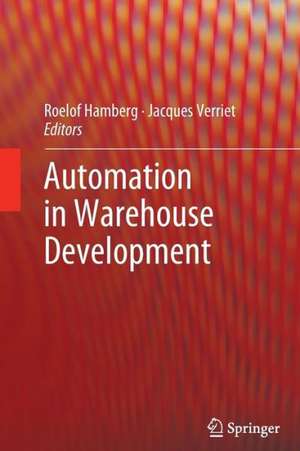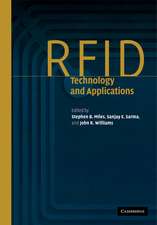Automation in Warehouse Development
Editat de Roelof Hamberg, Jacques Verrieten Limba Engleză Paperback – 30 noi 2013
Automation in Warehouse Development addresses both types of automation from the innovative perspective of applied science. In particular, it describes the outcomes of the Falcon project, a joint endeavour by a consortium of industrial and academic partners. The results include a model-based approach to automate warehouse control design, analysis models for warehouse design, concepts for robotic item handling and computer vision, and autonomous transport in warehouses.
Automation in Warehouse Development is targeted at both academic researchers and industrial practitioners. It provides state-of-the art research on warehouse automation and model-based warehouse design. These topics have been addressed from a systems engineering perspective by researchers from different disciplines including software, control, and mechanical engineering, with a clear focus on the industrial applications of their research.
| Toate formatele și edițiile | Preț | Express |
|---|---|---|
| Paperback (1) | 694.87 lei 6-8 săpt. | |
| SPRINGER LONDON – 30 noi 2013 | 694.87 lei 6-8 săpt. | |
| Hardback (1) | 644.18 lei 6-8 săpt. | |
| SPRINGER LONDON – 30 oct 2011 | 644.18 lei 6-8 săpt. |
Preț: 694.87 lei
Preț vechi: 817.50 lei
-15% Nou
Puncte Express: 1042
Preț estimativ în valută:
132.98€ • 138.32$ • 109.78£
132.98€ • 138.32$ • 109.78£
Carte tipărită la comandă
Livrare economică 14-28 aprilie
Preluare comenzi: 021 569.72.76
Specificații
ISBN-13: 9781447159742
ISBN-10: 1447159748
Pagini: 256
Ilustrații: XII, 244 p.
Dimensiuni: 155 x 235 x 13 mm
Greutate: 0.36 kg
Ediția:2012
Editura: SPRINGER LONDON
Colecția Springer
Locul publicării:London, United Kingdom
ISBN-10: 1447159748
Pagini: 256
Ilustrații: XII, 244 p.
Dimensiuni: 155 x 235 x 13 mm
Greutate: 0.36 kg
Ediția:2012
Editura: SPRINGER LONDON
Colecția Springer
Locul publicării:London, United Kingdom
Public țintă
Professional/practitionerCuprins
1. The Falcon Project: Model-Based Design of Automated Warehouses.- 2. A Reference Architecture Capturing Structure and Behaviour of Warehouse Control.- 3. Decentralised Warehouse Control Through Agent Organisations.- 4. Model-Driven Software Engineering.- 5. Aggregate Models of Order-Picking Workstations.- 6. Model Support for New Warehouse Concept Development.- 7. Warehouse System Configuration Support Through Models.- 8. An Industrial Solution to Automated Item Picking.- 9. Underactuated Robotic Hands for Grasping in Warehouses.- 10. Item Recognition, Learning, and Manipulation in a Warehouse Input Station.- 11. Object Recognition and Localisation for Item Picking.- 12. Integration of an Automated Order-Picking System.- 13. Self-Localisation and Map Building for Collision-Free Robot Motion.- 14. Flexible Transportation in Warehouses.- 15. Reflections on the Falcon Project.
Textul de pe ultima copertă
The warehouses of the future will come in a variety of forms, but with a few common ingredients. Firstly, human operational handling of items in warehouses is increasingly being replaced by automated item handling. Extended warehouse automation counteracts the scarcity of human operators and supports the quality of picking processes. Secondly, the development of models to simulate and analyse warehouse designs and their components facilitates the challenging task of developing warehouses that take into account each customer’s individual requirements and logistic processes.
Automation in Warehouse Development addresses both types of automation from the innovative perspective of applied science. In particular, it describes the outcomes of the Falcon project, a joint endeavour by a consortium of industrial and academic partners. The results include a model-based approach to automate warehouse control design, analysis models for warehouse design, concepts for robotic item handling and computer vision, and autonomous transport in warehouses.
Automation in Warehouse Development is targeted at both academic researchers and industrial practitioners. It provides state-of-the art research on warehouse automation and model-based warehouse design. These topics have been addressed from a systems engineering perspective by researchers from different disciplines including software, control, and mechanical engineering, with a clear focus on the industrial applications of their research.
Automation in Warehouse Development addresses both types of automation from the innovative perspective of applied science. In particular, it describes the outcomes of the Falcon project, a joint endeavour by a consortium of industrial and academic partners. The results include a model-based approach to automate warehouse control design, analysis models for warehouse design, concepts for robotic item handling and computer vision, and autonomous transport in warehouses.
Automation in Warehouse Development is targeted at both academic researchers and industrial practitioners. It provides state-of-the art research on warehouse automation and model-based warehouse design. These topics have been addressed from a systems engineering perspective by researchers from different disciplines including software, control, and mechanical engineering, with a clear focus on the industrial applications of their research.
Caracteristici
Addresses a higher level of automation in distribution centres/warehouses and the development of such logistic systems Covers a large part of warehouse development including robotic components for material handling, system analysis and design, and system-level control Describes how academic research can be applied to reduce the industrial challenge of designing complex logistic systems Includes supplementary material: sn.pub/extras














